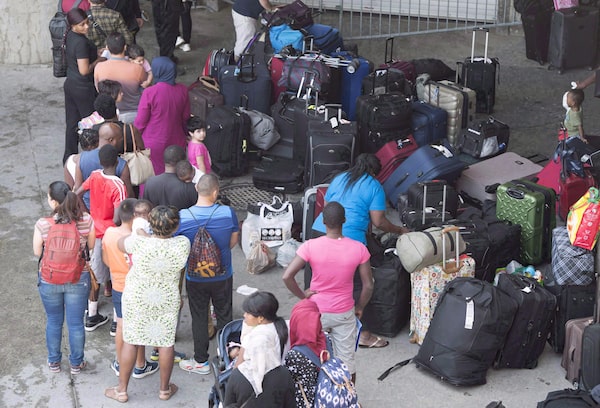
Asylum seekers line up to enter Olympic Stadium on Aug. 4, 2017, near Montreal.Paul Chiasson/The Canadian Press
High-risk immigrants, including those who may pose a threat to public safety, could be locked up in federal prisons under legislative changes being brought forward through the budget bill.
The government is also allocating $325-million to upgrade federal immigration detention centres to house those immigrants considered high-risk or a flight risk.
The move follows the decision by provinces this year to end immigration-detention agreements with the Canada Border Services Agency to house immigrants in their jails.
Migrant and human-rights organizations, including Amnesty International, have campaigned against jails being used to hold people under immigration law, saying the conditions were punitive.
At the end of last year, approximately 1,660 immigrants were detained in Canada, with 354 of them in provincial jails.
The budget proposes to introduce amendments to the Corrections and Conditional Release Act and the Immigration and Refugee Protection Act to enable the use of federal correctional facilities for high-risk immigration detention.
As well, the budget allocates $1.1-billion over three years to municipalities and provinces to meet the rising cost of housing asylum seekers through Ottawa’s Interim Housing Assistance Program (IHAP).
Provinces, especially Quebec, and big cities such as Toronto have been complaining about the cost of providing accommodation for the growing number of asylum seekers.
Ottawa earlier this year announced an additional $360-million through the program for provinces and municipalities, with $100-million of the funds earmarked for Quebec.
The federal government is footing the bill for approximately 4,000 hotel rooms to house around 7,300 asylum seekers, many of whom have been transferred from provincial shelters and churches, according to Immigration, Refugees and Citizenship Canada.
The additional $1.1-billion in funding for IHAP is designed to support provinces and municipalities, which have the responsibility to house asylum claimants. However, Ottawa says that starting in 2026-2027, the funding will be conditional on the provinces and municipalities finding permanent solutions to housing asylum seekers.
Ottawa will provide $141-million to pay for temporary lodging for asylum claimants, who cannot be accommodated because provincial places are full. The money could pay for hotel rooms for claimants who face homelessness.
Finance Minister Chrystia Freeland's latest budget projects spending of $535 billion this year, with a deficit of $39.8 billion. She says the spending plan is aimed at creating generational fairness, which will be funded, in part, by changes to capital gains taxes. (April 16, 2024)
The Canadian Press
The budget earmarks abound $745-million over five years to bolster the asylum system and help officials cope with the rising number of claims. The extra funding – which will be followed by an extra $159.5-million a year – is designed to speed up adjudication of claims, a system that has faced backlogs and delays.
The funding for Immigration, Refugees and Citizenship Canada, the Canada Border Services Agency and Immigration and Refugee Board will also help speed up removals of asylum seekers whose claims have been denied.
The budget also earmarks an additional $411-million in 2024-25 to pay for health care for asylum claimants and refugees who do not qualify for provincial health cards while their claims are being processed.
As well, Ottawa plans to spend $4-million for loans to support the travel of refugees and humanitarian immigrants to Canada; for example, by providing funds for plane tickets. Among those who might qualify for such loans are people who have applied to join family in Canada from Gaza.
The government also plans to spend $263.5-million over four years to support seasonal workers, including those working in the fishing industry in Atlantic Canada. The funding will address gaps in Employment Insurance support between seasons.
The budget also allocates $274-million over five years toward legal aid for asylum seekers and immigrants who cannot pay for legal assistance. The Department of Justice would also get $43.5-million a year for immigration and refugee legal services.